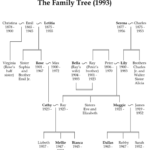Family names, or surnames, are an essential part of our identity, linking us to our ancestors and tracing our lineage through history. While family names are common in many cultures, their origins and meanings vary greatly across the world. Understanding the history and significance of surnames can provide insight into the cultural and geographical roots of a family.
1. The Origins of Family Names
Family names have existed in various forms for centuries, evolving for practical reasons. Initially, people often lived in small communities where a single name was sufficient to identify someone. However, as populations grew and communities expanded, additional identifiers were needed to distinguish individuals. Family names became necessary for administrative and social purposes.
In most cultures, surnames started to appear around the 12th century, although the exact timeline varies by region. These names often reflected occupations, locations, physical traits, or paternal lineage.
a. Occupational Surnames
Many surnames originated from occupations. These names would often be given to individuals based on their jobs or roles within the community. For instance, “Smith” is derived from the occupation of a blacksmith, while “Baker” denotes someone who baked bread. Similarly, “Fisher” or “Hunter” would be given to those whose primary livelihood involved fishing or hunting.
b. Geographical Surnames
Geographical surnames often originated from the place where a person lived, such as “London,” “Paris,” or “Hill.” These names could also refer to landmarks like rivers or mountains. For example, “Forest” could indicate someone who lived near a forest, while “Burgess” could indicate a person who lived near or in a town or fort (the word “burg” means a fortified settlement).
c. Patronymic Surnames
Patronymic surnames are those that come from the name of an ancestor, typically the father. In many cultures, these surnames are formed by adding a suffix to the father’s name. In Scandinavian countries, for example, surnames like “Andersen” or “Johansson” mean “son of Anders” or “son of Johan.” Similarly, in Ireland and Scotland, names like “O’Connor” (meaning grandson or descendant of Connor) or “MacDonald” (son of Donald) follow a similar tradition.
d. Descriptive Surnames
Some surnames originated from physical characteristics or traits. For instance, surnames such as “Brown,” “White,” “Short,” or “Young” might have been used to describe someone’s appearance or age. These descriptive names could refer to hair color, body size, or even temperament.
2. Regional Variations in Surname Origins
The origins of family names vary greatly across different parts of the world. Let’s take a closer look at some regions and their unique surname traditions:
a. European Family Names
- England: English surnames often stem from occupations, locations, or familial relations. Names like “Cooper” (barrel maker) or “Taylor” (tailor) reflect occupations, while “Derby” or “Hampton” are derived from geographical locations.
- Germany: German surnames often end in “-er” or “-mann,” indicating a connection to an occupation or geographical location, such as “Müller” (miller) or “Zimmermann” (carpenter).
- Spain: Spanish surnames typically have either a patronymic or geographical origin. For example, “González” (son of Gonzalo) or “Castro” (referring to a castle or fortified settlement).

b. Asian Family Names
- China: Chinese surnames often have a deep cultural significance, typically one character long. They often derive from ancient clans, geographical locations, or symbols of power or virtue. The surname “Li” (meaning “plum”) is one of the most common in China.
- India: Indian surnames often reflect caste, region, or occupation. For instance, “Sharma” (teacher or scholar) is a common Brahmin surname, while “Patel” is a common surname in Gujarat, indicating someone who was a village headman or landowner.
- Japan: Japanese surnames typically reflect nature, geography, or elements of the environment. For instance, “Tanaka” means “central rice field,” while “Yamamoto” means “base of the mountain.”
c. African Family Names
In many African cultures, surnames often carry great significance related to clan membership or lineage. In Nigeria, for example, the Yoruba people use patronymic surnames like “Ogunyemi,” which means “born of Ogun,” named after the god of iron. The Zulu people use names like “Mthembu,” meaning “descendant of Mthembu,” referring to the family’s origin.
3. The Changing Nature of Family Names
While family names have remained largely consistent in many cultures, globalization and social changes have impacted naming conventions. Immigration, intermarriage, and societal shifts have led to the adoption of new surnames, the simplification of existing ones, or even the merging of names across cultures. Additionally, some people choose to adopt or change their surnames for personal or professional reasons, further evolving the significance of family names.
4. Conclusion: The Power of Family Names
Family names serve as more than just identifiers—they are rich with cultural, historical, and familial meaning. Whether they represent a profession, a location, or an ancient ancestor, these names carry stories of where we come from and how our families have evolved over time. By understanding the origins and meanings of family names, we gain a deeper appreciation for the diversity and heritage of the world’s cultures.











